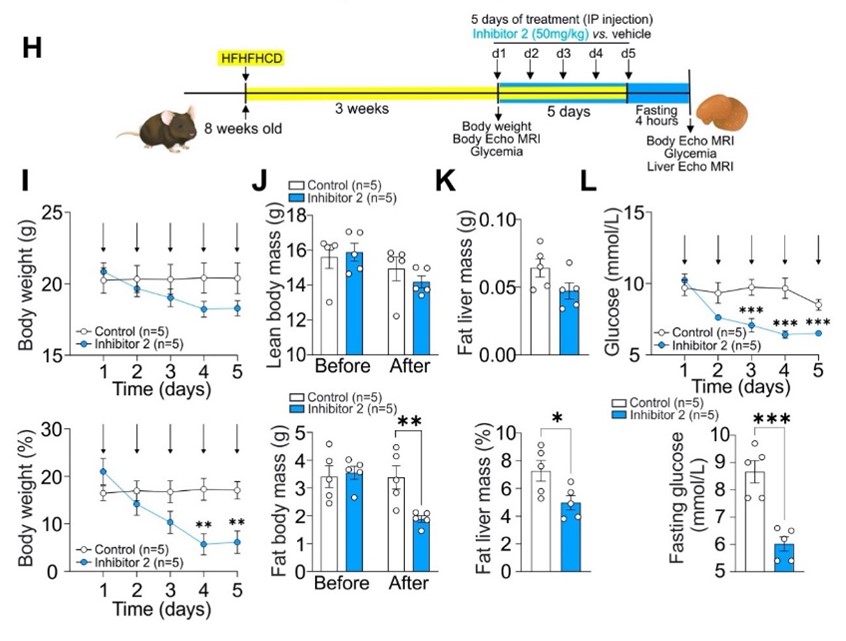In the same section
-
Share this page
Protein Tyrosine Phosphatase Receptor Kappa (PTPRK) Inhibitors for Treating Obesity-Induced Pathologies [Technology offer]
The technology in a nutshell
Small molecule inhibitors of Protein Tyrosine Phosphatase Receptor Kappa (PTPRK) for use in the treatment of obesity and obesity-induced pathologies including metabolic dysfunction-associated steatotic liver disease (MASLD) and hepatocellular carcinoma (HCC).
State of the art
Obesity, which affects more than 650 million individuals worldwide, is a well-established risk factor for MASLD which can in turn progress to HCC. With an increasing number of patients developing obesity-related liver complications, there is a pressing need to develop drugs based on new therapeutic approaches for the treatment of such diseases. Protein Tyrosine Phosphatases represent in this perspective a new class of emerging drug targets of specific interest, remaining still largely unexplored.
The invention
Fat accumulation, de novo lipogenesis, and glycolysis are key drivers of hepatocyte reprogramming and the consequent MASLD. Obesity leads to dysregulated expression of hepatic protein tyrosine phosphatases (PTPs). Among PTPs, PTPRK has been found by the inventors to be increased in steatotic hepatocytes and positively correlated with lipogenic signaling. In addition, the inventors demonstrated that silencing PTPRK in hepatoma cell lines resulted in reduced colony-forming ability and that PTPRK knock-out mice developed smaller tumours upon hepatocarcinogenesis induction, thereby shedding light on the key role of PTPRK in regulating hepatic glycolysis, lipid metabolism and tumour development.
In this context, the inventors have developed a series of small molecules PTPRK inhibitors providing new therapeutic possibilities for the treatment of obesity-associated liver diseases. The hit compounds series present a high stability and molecular affinity for the catalytic site of PTPRK and are amenable to a drug development program further to the validation of their specific inhibition activity on the PTPRK target through enzymatic activity assays using the recombinant PTPRK intracellular domain. The first in vitro results on cell lines also confirm the effect of those small molecules inhibitors on cancer cell lines growth. Pre-clinical in vivo studies in C57BL/6 mice demonstrate in addition that those compounds also induce a decrease of weight and body fat in obese mice opening thereby opportunities for obesity treatment.
Key advantages of the technology
- Inhibition of PTPRK’s catalytic activity with IC50 in the µM range amenable to lower concentrations upon hit to lead optimization.
- In vitro inhibition of cancer lines growth.
- In vivo demonstration of body fat reduction upon treatment of obese mice.
- Small molecules presenting no toxicity as assayed on Zebrafish larvae.
Potential applications
- Treatment of obesity
- Treatment of obesity induced HCC and other related hepatic diseases, such as MASLD

H) In vivo assessment of PTPRK Inhibitor 2 was conducted in C57Bl/6 male mice. The mice were treated with vehicle or 50mg/kg PTPRK Inhibitor 2 for 5 days.
(I-L) Body weight was measured daily (I), and body composition were measured before and after the treatment (J).
Liver composition analysis was performed (K) and glycaemia levels were assessed daily (L).
The reported data are presented as mean±SEM. Statistical significance is indicated as * p<0.05, ** p<0.01, *** p<0.001.
Technology Readiness Level

TRL-3 Proof of concept: in vitro inhibition of hepatic cancer lines and first in vivo results showing potential for development of obesity treatment.
The team

The Signal Transduction & Metabolism Laboratory, located on the academic hospital campus aims at translating research discoveries to the clinic through a combined use of molecular biology, stem cells research, animal models of metabolic disorders and human samples.

Relevant publication
Keywords
- Obesity-induced pathologies
- Hepatocellular Carcinoma (HCC)
- Small Molecule Inhibitor
- Protein Tyrosine Phosphatase
Collaboration type
- Licence agreement
- R&D&I collaboration
IP status
- EP 23383162.7
PCT/EP2024/082453
Priority date: 15/11/2023
Inventors
Esteban GURZOV
Eduardo GILGLIONI
José Antonio ENCINAR
Contact
ULB Research Department
Joachim Ruol
Business developer
+32 (0)496 75 94 93
joachim.ruol@ulb.be
